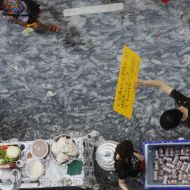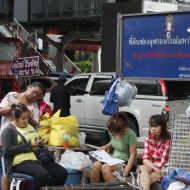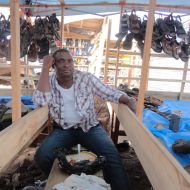From Informal Optometrists to Pirated ‘Game of Thrones’ Books, a Market That Has Everything
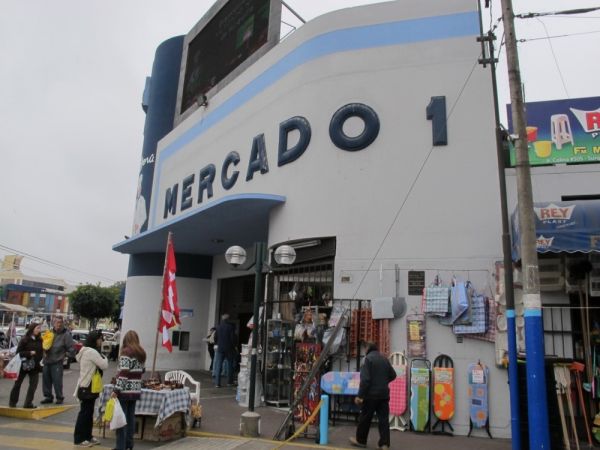
Surquillo Market Number 1.
It’s a typical weekend morning and dozens of Limeños are out shopping at the Surquillo Market Number 1. July has arrived, and Peru’s Independence Day is only a few weeks away. Just outside the market’s entrance half-a-dozen car washers are busy wiping down cars, and everywhere you look vendors are selling Peruvian flags of all sizes, along with other patriotic paraphernalia.
The informality of the market is hard to ignore. Scores of vendors stand outside the market’s walls, selling everything from blenders and sweatshirts to hand-carved wooden toys and food. Stores inside the building aren’t necessarily any more formal, and some feature the always popular bootlegged DVDs and pirated books.
Sergio Masa, a street vendor who looks to be in his late sixties, has set up his cart on the sidewalk a few feet from the market’s entrance. Sergio sells all sorts of eyewear, and offers me a pair of new reading glasses for 50 soles, around $18 USD.
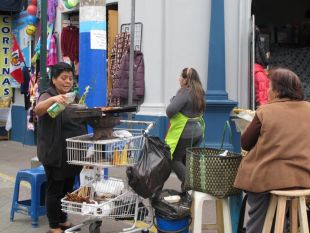
The market is a classic mix of Lima’s formal and informal realms.
“You’ll need to bring in your script,” he says, sitting on a stool behind his makeshift counter. Passersby stop to look at the glasses inside his display case.
“I can have them ready in two days,” Sergio adds, and goes on to show me a pair of bifocals a customer ordered from him last week. Nearby, Delia Condori, a short and slender woman, is standing by a doorway next to two wooden racks that feature dozens of pirated books, including bestselling titles like Fifty Shades of Grey, the Steve Jobs biography and Dan Brown’s Inferno.
She offers to show me more books, and brings me into her small stand inside the building located just a few feet from the doorway. Inside even more pirated books line the shelves of a green bookcase.
“I have the Game of Thrones collection, all five books” she says, handing me a copy. The strange cover, cheap paper and slanted text make it obvious that the book is a pirated copy. “It’s a popular television series,” she says, and offers to sell me the book for 20 soles (about $7 USD). Delia adds that she’s already sold out of the first book in the series. “I will have some more copies this week,” she promises, handing me her light-blue business card.
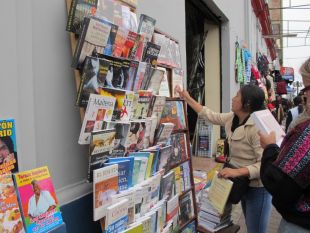
Delia Condori shows off her selection of pirated books.
The market, like many in Lima, has become a hub for all types of commerce, and provides a place for many informal vendors to gather and seamlessly integrate with the formal world. Much like the Polvos Azules shopping center, Surquillo depicts to what degree informality has become institutionalized in the city.
Last April a group of street vendors were evicted from the nearby Surquillo Market Number 2 after local officials claimed they were blocking emergency exits. According to a local paper, some of the vendors had been stationed at the market for over 30 years before being evicted.
But at Surquillo’s Market Number 1 vendors continue to make a place for themselves on the street. Police officers stroll by street vendors selling pirated CDs – one even stops to check out the selection. A woman is grilling chicken on skewers from a makeshift barbecue made from an old shopping cart. Opposite her, two women have set up shop, and are displaying the different varieties of tamales they sell. “These are homemade,” one of them says proudly. She tells me they come to this very spot every weekend and holiday to take advantage of the heavy pedestrian traffic the market pulls in.
They sell three different kinds of tamales, and prices range between two and three soles apiece. “The favorite is the pork tamale,” she says. “It’s the one with the most flavor.” The other woman, wrapped in a heavy gray coat, says they’ve become a destination for shoppers who are feeling peckish. Sales, she says, have been steady, and customers leave happy. “They like what we offer.”

